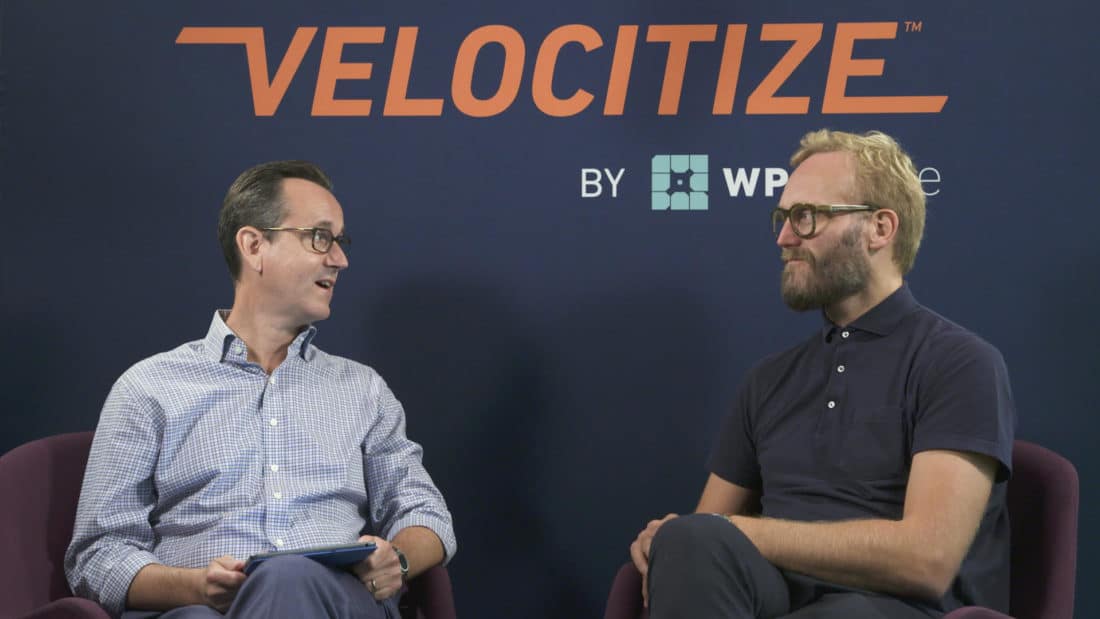Nicolas Roope is the co-founder and Creative Director at Plumen, a boutique sustainable lighting company, famed for creating “The World’s First Designer, Energy Saving Light-Bulb,” the Plumen 001. He was also Publicis.Poke‘s former creative chairman and co-founder. Roope has worked more than 20 years in the design industry and has spent his career at the forefront of the digital revolution.
Roope specializes in helping companies establish a clear and grounded vision through his ability to strategically navigate the overlap of creativity, design and technology. During his career, he has been awarded The Design Entrepreneur Medal (2014), The Drum’s Entrepreneur Honor (2015), The Wired 100 (2011), AdAge Creative 50 (2011), The Tech City Insider 100, and the BIMA Digital Hall of Fame (inaugural 20).
In this episode of Velocitize Talks, Roope shares his insights on emergent technologies, design and purpose-driven branding.
Given your experience in both design and digital, what inspired you to start your current company, Plumen? (0:40)
“With my knowledge of how the digital landscape works, I understand products in a different way.”
Having spent most of his life as a creative director and agency founder, it often surprises people to know that Roope helped start Plumen, a sustainable lighting business. This unique perspective, he says, has been essential to the success of Plumen over the years.
How do you think the process of brand building has evolved? (1:32)
“Brand building, for the most part, hasn’t evolved. It has resisted the change.”
Branding hasn’t experienced the full evolution that some expected. You continue to see the same type of campaigns you would have seen 50 years ago. Some new emergent product brands are adopting a fresh approach in response to digital. Their ability to effectively and strategically establish a compelling digital presence has allowed them to punch above their weight. As a result, a new, effective approach to branding has emerged. The question for these emergent brands enjoying newfound success is, how do we make this sustainable?
How do you approach company culture? (3:23)
“We’ve always seen creativity as a means to unlock potential.”
Publicis (Poke) is constantly shedding its skin and reinventing itself, including the way it defines culture throughout the business. Encouraging and safeguarding creativity has always been key to the way they have cultivated culture.
Do you think the importance of design is recognized more now than in previous years? (4:40)
“One of the unrecognized truths about design is that so much of its power lies not in how things look but in how they are engineered.”
We jump quickly to aesthetics when we talk about design. Ten years ago we were creating web pages; now we are creating ecosystems. For example, your website or owned properties sit in a digital neighborhood, surrounded by connecting sites that make up your online ecosystem. Thus, the focus should not be on the way things look but instead on the way things are powered.
How do you effectively implement personalization? (8:10)
“We need to recognize that data is important and that it shouldn’t be abused.”
When it comes to personalization and the abuse of data, we stand to lose a lot more than we stand to gain.
Purpose is a powerful way for consumers to connect with brands. Is it pivotal to a brand’s success? (13:00)
“Establishing purpose is key to building a living brand rather than just creating a static product.”
When you establish purpose, you’re starting a conversation with your customers and with the world that reinforces the relevance of your product but also the relevance of your behavior.
To learn more about Nicolas Roope’s work, check out Plumen, Poke and The Lovie Awards or follow him on LinkedIn.
